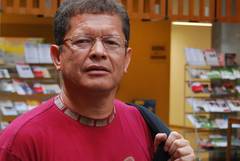Colombia: coffee, drugs and solidarity fatigue

"We keep working to achieve truth, justice and reparations", says Milton Mejía, a Colombian Presbyterian theologian.
Photo: Juan Michel/WCC
Solidarity fatigue is one of the main obstacles faced by Colombian civil society organizations struggling to find a resolution to the country's 40-year long internal armed conflict, an ecumenical gathering has been told. Participants also heard a renewed call to action.
"For many, Colombia equals coffee and drugs", said Presbyterian theologian Milton Mejía. Those stereotypes are compounded by a decades-long internal armed conflict that "seems to be worsening constantly", Mejía added, the result being "a widespread loss of interest and fatigue".
According to Mejía, who coordinates the Observatory of Church and Society at the Reformed University of Barranquilla, this solidarity fatigue affects even international organizations towards which Colombians turn for support. As a consequence, Colombians face difficulties when trying to explain the extent and urgency of the humanitarian crisis in their country.
However, Mejía made a plea for support to initiatives like the Ethical Truth Commission, aimed at protecting the rights and collective memory of the victims of state crimes. He also asked for the implementation of an accompaniment programme modelled on the Ecumenical Accompaniment Programme in Palestine Israel.
Mejía spoke at a hearing session of the World Council of Churches (WCC) Global Ecumenical Network on Migration, which is holding its annual meeting in Geneva, Switzerland, 24-30 June. The session focused on what ecumenical organizations in Colombia have labelled as the worst humanitarian crisis of the Americas and one of the most serious in the world.
According to government statistics, 3.2 million Colombians have been forced from their homes by the violence, but non-governmental organizations raise that figure to 4.6 million. In 2008 the UN High Commissioner for Refugees had estimated in 552,000 the number of Colombians seeking refuge in other countries.
In a context where the internal armed conflict involves the military, rebel groups, drug-traffickers and paramilitaries, Colombian churches and ecumenical organizations label the country's situation as marked by an ethical crisis.
"There is an inversion of basic values in society", said Mejía. "A culture of lawlessness has been established; any means can be used to achieve goals; victims are portrayed as guilty and perpetrators made to look like heroes", he added.
According to Mejía, the government's propaganda machine downplays the armed conflict for the benefit of business while it demonizes political opposition, human rights defenders and judges who investigate crimes by the paramilitary. "We are all labelled as sympathizers or advocates of terrorism - or useful idiots", said Mejía.
However, Mejía highlighted the fact that communities and social organizations "offer resistance to this logic and try to build alternatives". Even if "sometimes the dream of building a better future seems to be a nightmare", he added, "we keep working to achieve truth, justice and reparations".
Next year in Colombia
The WCC Global Ecumenical Network on Migration will hold its 2011 meeting in Colombia. "It will be a concrete sign of solidarity with the churches and the affected population", said Sydia Nduna, WCC programme executive for Migration and Social Justice, speaking on behalf of the GEM.
According to Nduna, participants coming from abroad will have the opportunity to interact with the local churches. They will hold consultative and advocacy-focused meetings with government officials, church leaders and civil society organizations.
A three-day public hearing on conflict situations worldwide will be followed by visits to camps of internally displaced people and refugee camps at the borders with Ecuador and Venezuela.
Between now and the GEM hearing and meeting next year in Colombia, added Nduna, it is expected that any WCC-led initiative on the country will take into account the humanitarian crisis and the migration perspective.
Among the ecumenical partners working together in Colombia are the WCC, the Latin American Council of Churches, ACT Alliance, the Colombian Ecumenical Network, the Inter-Church Commission on Justice and Peace, and the Latin American Network for Migration.
Global Ecumenical Network on Migration
WCC member churches in Colombia
WCC Executive Committee calls for a peaceful resolution of the Colombian conflict (26 February 2010)
WCC Living Letters visit to Colombia (December 2008)
Colombia Ethical Truth Commission (in Spanish)



